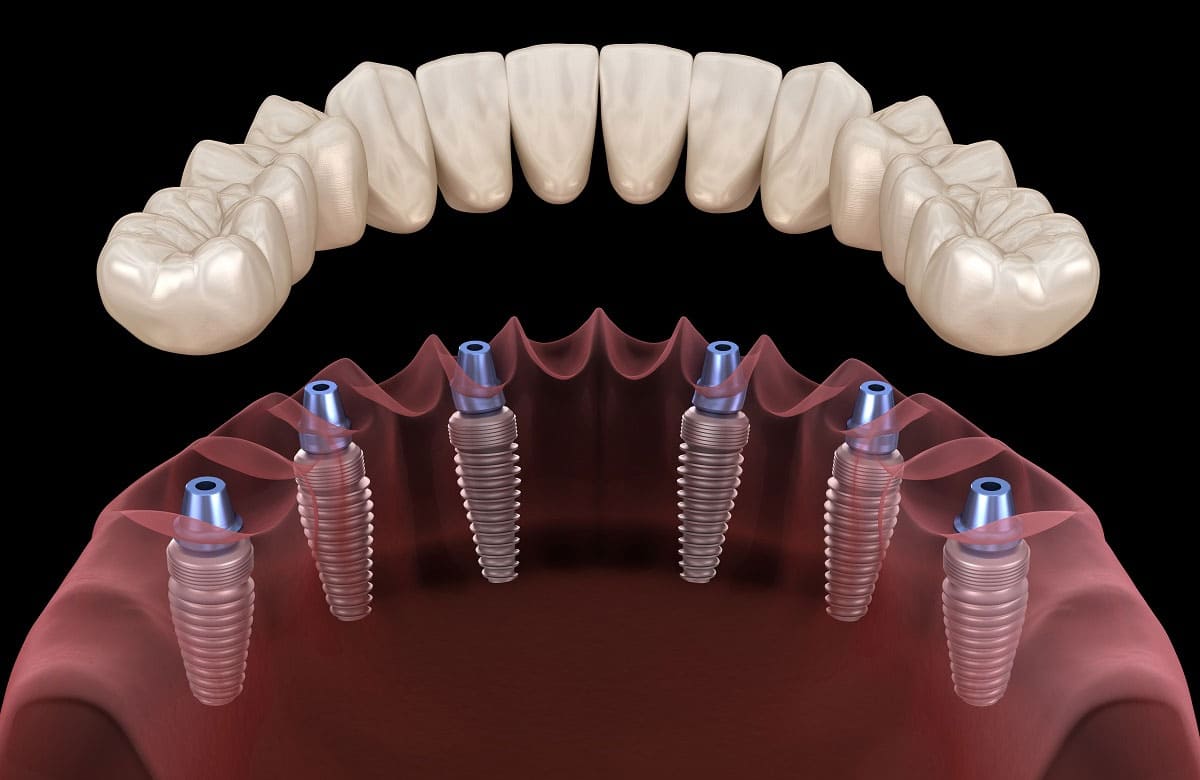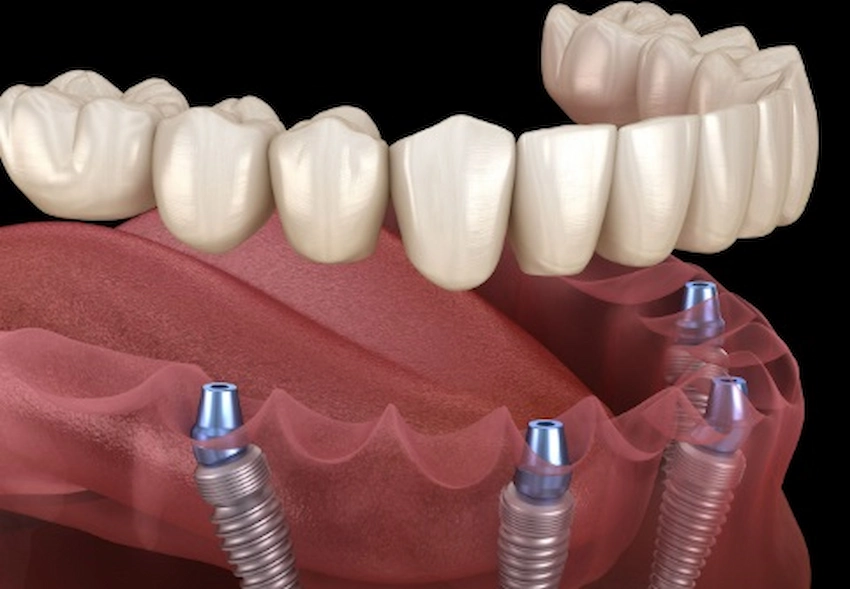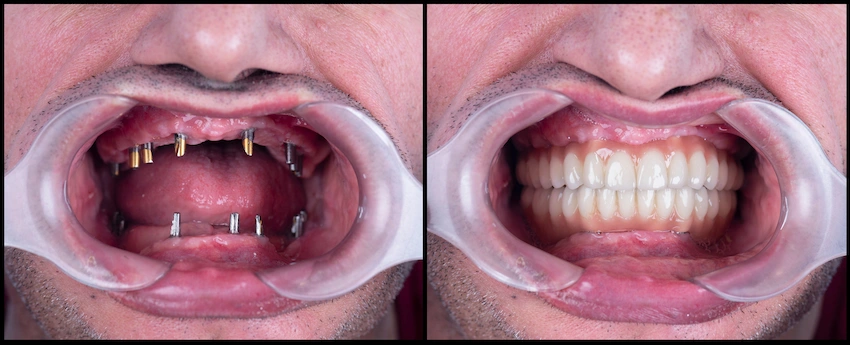🦷Full Mouth Dental Implants: A Complete Guide

Discover the remarkable benefits of full mouth dental implants, bringing numerous advantages from improved functionality to enhanced aesthetics that can make you smile confidently like never before. If you’re seriously considering the possibility of restoring your smile using full mouth dental implants, then you’ve come across the right comprehensive guide that is designed to delve deep into everything you need to know regarding this procedure which includes the benefits, its procedure, costs, and even the recovery process.
In discovering these transformative effects that full mouth implants have on oral health as well as on self-confidence provided by their lasting solution for missing teeth, therefore this is a guide that is so informative and will give you all the information that you need so as to help you regain your confidence in your smile as well as to restore the full functionality of your teeth like never before.
What are Full Mouth Dental Implants?
Full mouth dental implants can be described as one of the amazing solutions available today when it comes to replacing missing teeth for patients who may have lost some or most of their teeth. Simply put, full mouth dental implants consist of titanium posts that are surgically placed into the jawbone acting as artificial tooth roots that the body can accept as its own.
An important process known as osseointegration follows whereby the jawbone actually fuses with these inserted screws which creates a very solid foundation that is ideal for holding on to specially designed prosthetic teeth. A realization by way of this treatment that is never exaggerated is that the same might not be able to restore functionality of teeth but may also enhance aesthetics and boost confidence levels; hence patients are now able to eat whatever they want without any fear or restriction with regard to what they eat.
Benefits of Full Mouth Dental Implants
When compared with other local tooth replacement options such as traditional dentures, these non-removable and full-mouth dental implants possess characteristics that make them among the best options available. Below are the main benefits you can enjoy by opting for full mouth dental implants.
- Improved Oral Function: Full mouth implants are not only effective in returning almost the same oral functionalities as natural teeth but also in restoring full chewing function. This means that patients are able to take balanced diets that consist of all the essential nutrients in the right amounts without any restrictions.
- Enhanced Aesthetics: In terms of appearance full mouth dental implants resemble real teeth so closely to a point where other people may not even know they are not real teeth hence they positively improve one’s smile. With full mouth implants, one can have an attractive natural-looking smile that enhances their self-confidence allowing them to socialize without any worries about their appearance.
- Durability and Longevity: Unlike conventional dentures and bridges that may require replacement every few years, these durable implants can last for a long period if taken care of properly. Full mouth implants become part of your body due to osseointegration; therefore, their life expectancy is similar to that of natural teeth.
- Convenience: Full mouth dental implants do not necessarily need the hassles that are usually associated with
- Long-Term Durability: The great thing is that if you take good care of full mouth implants, they could last for a long time and be the best option for your money in the end because you won’t have to replace them frequently.
- Bone Preservation: Another important benefit of dental implants is that they can also keep the jawbone from being absorbed and receding once more after a tooth or teeth are lost, which might happen in other situations. This is a process known as bone preservation and it is essential to maintain their structure.
- No Slippage: Last but not least, it is important to remember that implants are completely different from dentures since they do not move around or slip from their positions one bit and offer stability to the user.
Candidates for Full Mouth Dental Implants

Full mouth dental implants are an exceptional remedy meant for individuals who have suffered loss of several or all their natural teeth. This kind of implants are mostly recommended to the following head of persons:
- Overall Health: Inasmuch as full mouth dental implants are very much needed for improving on the social life of individuals, it is important that panel health check is conducted on the same group of individuals in order that the healing may go on well and the conclusion would not be larger issues that when surgery commenced would cause nagging diseases.
- Bone Density: For the placement of full mouth dental implants to be successful, it is critical that the jawbone under the gums has a sufficient density and width for the placement of the screws, as often performed on the full articular surfaces. In cases of lower bone density, the dentist may perform bone grafting, thus enhancing the opportunity to place the implants successfully.
- Age: It is essential for candidates to be adults over the age of eighteen, as this age marks the completion of the entire growth process of the jawbone. The requirement is to ensure that the jaw is an adult suitable, comprehensive and hurry free ally arms make candidates to receive the required assistance in this regard, which leads to the improvement of their health standards and their general appearance.
- Dental Hygiene: To effectively undergo and maintain the implants, this is the level of dental hygiene that should be adopted by the candidate. The patients are made to understand the need for regular cleaning of their mouths so that their implants may survive in the coming years, demonstrating the need for a health-oriented approach in the modifications of the habits of the patients and hence there is high failure in carrying out treatment to patients who have not been informed enough and credibly regarding the modalities of proper care.
- Smoking: People who have a smoking habit or who would be willing to stop the same should be the ones to be considered for this kind of treatment. Smoking does have a negative influence on the recovery process of those who have had dental implants placed, and to some extent hinders the results.
Ultimately, the final assessment will be carried out by a dentist through various procedures for the identification of conditions making the person fit for full mouth dental implants. The forms are essential and make it possible for the dentist to represent each person not only on the basis of objective findings but on the basis of the embrace of the sought-after format of the new photo, as well as those goals which arise in the courseThis is a multi-step procedure that involves a thorough treatment process.
After the placement of dental implants, a few months of healing time is necessary to enable successful bonding of the implants and the jaw bone. This integration process is crucial as it enhances the stability and durability of the implants as well as the overall success of the procedure and the likelihood of successful restoration of dental function.Following the successful healing process and after getting back to health, abutments are then fixed on the implants as the final step before the provision of new teeth.
Recovery and Aftercare for Full Mouth Dental Implants
After getting through full mouth dental implants surgery, the recovery phase is considered as the most crucial for a positive outcome. During the early days after the second surgery, you may experience some swelling and pain, but by taking medication that the doctor has prescribed for the pain, these symptoms will become very airborne. In the first place, one has to stick to aftercare instructions from the dentist to participate in successful healing of the treated areas. Simply follow the guidelines below and you are most likely to achieve excellent results.
You should practice the morning-after ritual which is rinsing your mouth every mealtime by using a salt solution that the doctor has proposed to avoid any trouble. Refrain from consuming such foods as nuts, cookies, and candy that may exert pressure on the treated areas and lead to their breakdown, for a start. For the first few days, during the time when the mouth is still sore, patients are supposed to consume soft foods such as curd, jelly, and even smoothies to avoid any discomfort.
Attend all the scheduled check-ups with your dentist so that there is an opportunity for him/her to monitor your healing progress and determine the effectiveness of the new treatment. On a daily basis, brush your teeth gently twice using a toothbrush that has fine bristles and also clean in between the teeth and the gums.
By strictly adhering to such prescribed aftercare steps, it can be assured that the metal implants courageously fused with the jaw bone and created a new and strong root system that is hope for years to come. Thus, following through on prescribed aftercare care and continuing good oral hygiene is essential for the success of dental implants.
Risks and Complications of Full Mouth Dental Implants

In addition to the benefits offered by the full mouth dental implants procedure, there are, however, potential risks and complications that must be carefully considered. The awareness of these aspects is crucial for enabling better decisions regarding oral care, thereby avoiding consequences.
An infection at the site of the implant is a mostly untroublesome complication of the procedure, but it can be one of the most common, yet a severe one. In extremely rare cases, the metal implants will definitely get free, in addition, they may also become unusable, if right precautions are not taken. Once the cost of the dental implantation has been finalized, it is irreversible, and achieving the result will require an investment of not just money but also of time.
Some individuals may develop a resistance to the dental implants, which they perceive as a strange thing in their mouths. Patients would do well to engage in a discussion on the potential pitfalls associated with a given case of hazards, find the support of their doctor, and make informed sentences. Sinus complications resulting from intraoperative dental implant placement to the maxillae are a common complaint today but were unheard of twenty years ago.
Increased bleeding, a major complication of the procedure, has to be given special attention as some patients might face the problem of excess blood during the activity, or atrophy, after the operation, which will bring about only fear, even if there is still a minor flow hence the patient is advised to explore all the possibilities of the situations on those sides and the possible ways of averting the same with the doctor. Other questions to ask the surgeon may be how to avoid heavy exercises and mention them if they occurred, how to deal with such a situation, and whether avoiding long flights is a viable option.
Frequently Asked Questions About Full Mouth Dental Implants
Full mouth dental implants are a solution for replacing missing teeth, using titanium posts inserted into the jawbone. These posts act as artificial roots to support prosthetic teeth, offering improved functionality and aesthetics.
The benefits of full mouth dental implants include enhanced oral function, improved aesthetics, and increased self-confidence. They provide a stable, long-lasting alternative to dentures and help preserve the jawbone structure.
Candidates for full mouth dental implants are individuals with missing teeth, sufficient jawbone density, and overall good oral health. A dentist will assess these factors to determine if implants are the right choice for restoring dental function.
The full mouth dental implant procedure typically takes several months, including the time for osseointegration, where the implants fuse with the jawbone. The overall process may take anywhere from 3 to 6 months, depending on individual circumstances.
The procedure is performed under local anesthesia or sedation, so patients do not experience pain during the surgery. Post-surgery discomfort is manageable with prescribed pain relievers, and most patients recover in a few days.
With proper care, full mouth dental implants can last for 15 years or more. The durability of implants makes them a long-term solution compared to dentures, which may require frequent replacements.
The recovery process involves a healing period of a few months for osseointegration. Patients may experience some swelling and discomfort initially, but following aftercare instructions and attending follow-up appointments ensure a smooth recovery.
The cost of full mouth dental implants can range from $15,000 to $30,000 depending on factors like the material used, the number of implants, and the complexity of the procedure. However, they provide a long-term solution, making them a worthwhile investment.
While rare, complications may include infection, bleeding, or implant failure. It is essential to follow aftercare instructions and attend follow-up visits to minimize these risks.
Maintaining your implants involves practicing good oral hygiene, including brushing, flossing, and regular dental check-ups. Avoiding hard or sticky foods and following your dentist’s advice ensures the longevity of your implants.




